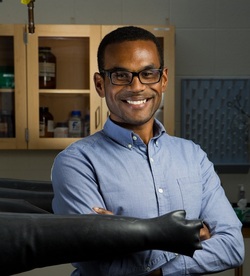

Born in Chattanooga, Tenn., Ball’s fascination with Chemistry started in his early days and followed him from Macalester College, where he received his BA in Chemistry, to Univ. of Michigan - Ann Arbor (Masters, Ph.D.), and the California Institute of Technology, where he was a Postdoctoral Scholar.
Q: How did you begin studying your subject?
A: Our elementary school had this scholastic book club, and I purchased a space-rock crystal kit that had a solution you could place a rock into to form crystals. I didn’t know at the time, but it was essentially organic chemistry at work, using a saturated solution to form crystals! It basically built from there.
Q: Did you major in chemistry at college?
A: I went in there planning to do bio, and like most science students, I was convinced I would do pre-med and become a doctor. During a summer science program much like the one here, a chemistry professor took interest in me and invited me into his lab. His interest in me really got me initially fascinated. People should be able to ask questions, know how to take things apart and put them back together. I just liked trying to understand the things that go on around me. On a separate note, I feel like more people of color should pursue things that interest them even when they are seemingly difficult, and get those credentials that let them do the things they want without being second-guessed.
Q: Tell us about your organometallics and catalysis lab. Where did the interest begin?
A: My interest really began during my PhD research. I wanted to develop a reaction that people would actually use, and I think that people are really intrigued by the idea of using waste materials to create new useful compounds. We figure out ways of incorporating waste molecules into organic molecules using metallic catalysis. If we turn on a car engine and spill out carbon monoxide and sulfur dioxide, we start to think “Oh. They are just staying up in the air and polluting our environment." The same elements in these pollutants are used to synthesize some of the most useful industrial chemicals are still present in these pollutants. We use modern organic chemistry to develop new methods of incorporating atmospheric pollutants into useful organic compounds.
Q: Can you give us an overview of your Organic Chemistry II class?
A: It is the quintessential liberal arts course. We take your skills from arrow-pushing mechanisms and acid-base chemistry and kick it up a notch. You cannot memorize information; you have to appreciate a new language, learn how to draw structures (it’s a kind of art) and learn to appreciate the synthesis of important molecules. We do exactly what they do in drug companies and agrochemical companies and we learn a lot about metal catalysis and how to make carbon- carbon bonds and carbon- heteroatom bonds.
Q: Which myths did you hear coming into Amherst? Have they been debunked or confirmed?
A: I was told that the faculty have a lot of input in the school, and until I got here I had not realized how much input that meant. It is really interesting to work in a place where you are actively involved in trying to improve your work environment. Regarding students, I came in expecting to find students singing in all sorts of random places, and I must say, I did not. Thirdly, I was told that Amherst Students tend to get trapped in an ‘Amherst Bubble’. We need to create more ways for students to get off campus and see some of the things available to them off campus. I would endorse The Book Mill, Montague and Easthampton.
Q: What do you want to contribute to Amherst during your time here?
A: To stick with the status quo would be a disaster. I believe the faculty is having many thoughtful conversations about how the future of the college should go structurally and otherwise. What I hope to do is to keep being a part of that conversation. But above everything, I hope to get better and better at delivering quality education to my students while getting them interested and involved in research.
Correction: The “Fresh Faculty” article on Feb 5. contained several errors.
The article misstated where Professor Nicholas Ball received his Ph.D. He received his Ph.D. from the University of Michigan, not the California Institute of Technology. He was a Postdoctoral Scholar at the California Institute of Technology.
The article also misspelled a word in one of Ball’s responses. Ball said, “We take your skills from arrow-pushing mechanisms and acid-base chemistry and kick it up a notch.” He did not say “aero-pushing mechanisms.”
Finally, the article took out of context Ball’s statement that “To stick with the status quo would be a disaster.” In the interview, Ball said that Amherst College recognizes that it must always continue to improve rather than sticking with the status quo. He was not implying that the College is currently on a disastrous trajectory.
Greetings! Very helpful advice in this particular article!
It's the little changes that will make the greatest changes.
Thanks a lot for sharing!
Here is my weblog; lawn treatment